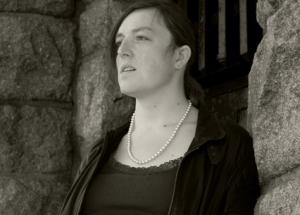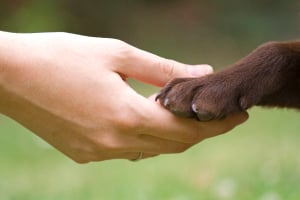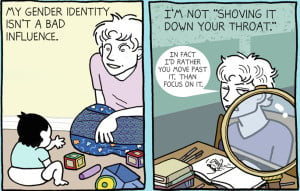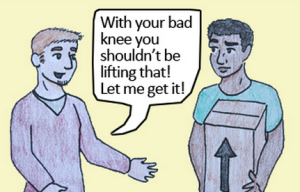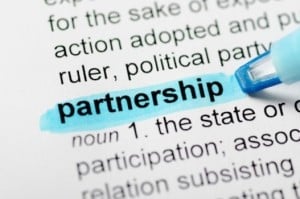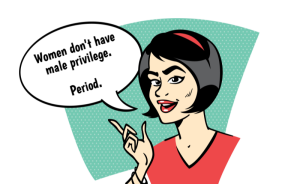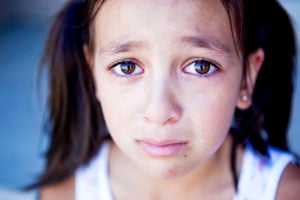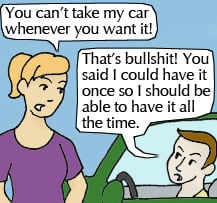Originally published on xoJane and republished here with their permission.
(Content Warning: sexual assault, rape, rape culture, victim-blaming)
Recently, I read a story on Gothamist about a woman who asserted she was drugged and raped by a bar employee in New York’s Lower East Side.
When she alerted the cops, one distinctly asked her if she was a “party girl,” as if to pin the blame on her for her own attack. The establishment immediately fired the person who was accused of the infraction, but someone also posted a video online asking people to draw their own conclusions as to what happened that night, as there was some video footage of the woman interacting with the man.
Essentially, the bar owners made a difficult situation even worse by publicly challenging the woman’s story.
In reading about that incident, I cringed as it brought back a terrible memory, one that I’d worked hard to push back to the depths of my mind. Here I am, 18 years after the fact, and just now do I finally feel confident to tell my story.
I started suffering from depression at age twelve, and had only made limited progress by age thirteen. But physically, within that year, I’d changed. I’d ditched my thick glasses for contacts, I starting wearing makeup, and I wore more flattering outfits than the oversized Nirvana T-shirts I’d been previously wearing religiously.
My breasts had come in, and they were much larger than those of my female peers. I was still a scared, nerdy girl at heart, but somehow I started getting attention from all sorts of people, many of whom were not the types of people I was used to associating with.
One such guy was someone I’ll call Raymond.
Raymond was an athlete who’d been held back a year in school, and was fifteen years old when I first met him, much larger than most of his classmates. He was popular, and all the pretty girls seemed to like him. We had friends in common, but I don’t recall ever having said more than two words to him at school.
One day, my mom dropped me off at Northdale Court, a local strip mall where us young teens would gather on Friday and Saturday nights to play laser tag, watch movies and, well, act like teenagers. There was plenty of the screaming and flirting that adolescent boys and girls are well known for, and our conversations basically all revolved around who liked who and why.
“I’m Whitney,” I said. He took my hand to shake it, and continued to hanging on. For a second, it felt electric.
“Take a walk with me,” he said.
I was enticed. It wasn’t often that one of the popular kids at my school would talk to me, and I felt a mix of emotions wash over me. Am I really holding hands with a cool kid? What does this all mean? I followed him, not knowing what to expect. It turned out that decision would change my life.
He walked me around a dark corner, and sat me down in the grass. I distinctly remember the dumpster in front of us, blocking us from view, and remember thinking about how cold I suddenly felt in the Florida air.
Something was amiss, but I was too naïve to put my finger on what – until he pushed me down on the ground and began grinding on my body.
“I don’t think this is a good idea,” I said. I told him I wanted to go back out front. I told him he was making me uncomfortable. He pushed himself on me even harder.
I lay there terrified as to what was happening, too afraid to scream and pinned to the ground so I couldn’t get away. He jammed his tongue down my throat. I felt terrified and tried to mentally escape by thinking about other things. He put his fingers up my shirt and began touching my breasts.
I was nauseous. After all, until this point I’d maybe kissed a boy two or three times – was my first sexual experience really going to happen like this? My eyes welled up with tears as he gyrated on me, poking me through his pants as I tried to mentally escape and pretend it all wasn’t happening.
After about ten minutes of this, he got up and walked away, saying little as he left. That would be the second-to-last time I ever spoke to him.
I went home and stayed quiet on the ride home, as I felt disgusting and too ashamed to say anything to my parents. When I got to my house, I cried about what happened. I wrote about it in my journal, a journal I had to throw away because years later as I flipped through it, it was too traumatic for me to relive the depression mixed with the pain of being forced to the ground and groped by a near stranger.
The next Monday at school, I confided in my friend JT. I don’t know what I expected of him, except that we was a nice guy that I trusted and respected. But what he said startled me.
“I’m going to beat his ass,” he told me.
I was on edge all day as rumors of what was happening swirled around school. A girl who rode my bus to school grabbed my arm and threatened me in the hallway, telling me to stop talking shit.
JT was on the hunt for Raymond, waiting to find him alone so he could hit him in the face.
As someone who was already anxious all the time, I couldn’t wait to go home and pretend none of this had ever happened. A situation that started out badly had, in my mind, already become even worse because I said something. Let’s just pause for a second to think about how fucked up that is.
But it didn’t get any better. JT’s threats started circulating around school. Soon, the assistant principal, a man, plucked me from class and pulled he into his office.
As far as assistant principals go, suffice it to say I never liked this person. He wasn’t a cool type that I could talk to about my problems; in fact, I barely knew this man, and he struck me as very out of touch.
The moment I entered the office, I knew things were only going to get worse, especially when I found myself face-to-face with Raymond.
“So, do you want to tell me what this is all about?” the assistant principal asked as I looked Raymond in the eye.
Again, I’d never had any kind of sexual experience before this one, yet here I was feeling ashamed and embarrassed telling a strange adult I didn’t trust about what had happened. And, this all went down in front of my attacker.
“But did you ever say no or tell him to stop?”
“I told him he was making me uncomfortable.”
“I don’t remember you saying that,” Raymond chimed in.
“But did you say no?” the principal asked me again.
I swallowed, holding back tears. “I was too scared of what might happen if I did. So, I didn’t say anything. Instead, I tried to pretend it wasn’t happening.”
Perhaps the biggest problem in growing up with depression and anxiety is that you’re always scared of what might happen if you say something. And, when your worst dreams become a reality, it leaves a lasting impression.
The principal turned to me. “You know I can suspend you for spreading rumors, right?”
At the time, I nearly a straight-A student. I strived to make up for my lack of self-confidence by excelling in school, and doing so was one of the only things that helped me feel a little bit better about my world during an otherwise tough time. The thought of being kicked out of school made me sick in my gut.
And, as young as I was, I couldn’t understand why. Why would I be the one suspended when I was also the victim?
That day eventually ended, but the nightmare at school continued for weeks as I hid in the corners of the schoolyard and ignored nearly everyone while I waited for the drama to pass. Just as I’d always done, I tried to pretend it had never happened, and eventually it all went away.
I’d like to tell you that story made me much stronger as I grew through my teenage years, but the reality is that learning that you have no recourse after a sexual assault can really mold your perception of what it means to be woman.
Soon after, I began binge drinking and skipping school. I cut myself to try to release the pain. I lost my virginity within a year or so of the incident and ultimately stopped caring who I was sleeping with or what I was doing to myself and my body.
Psychologists will tell you that someone who has been a victim once is far more likely to be victimized again. It took me many years to realize that the way men treated me throughout my teen years was not normal.
I constantly felt worthless, and that feeling permeated throughout my personality to somehow turn me into a walking target. Many of the situations that I encountered as a teenager I today understand to be non-consensual and forcible acts, but back then, fourteen-year-old me would shrug off getting blackout drunk and finding myself in bed the next morning with a 24-year-old who’d deliberately supplied me with alcohol to do exactly that.
It took a very long time, but after years of reading too many stories like the one I read at the beginning of this piece, I’m finally also ready to speak out.
When it comes to cases of sexual assault and rape, the system often keeps women quiet.
I’ll hear stories about women who go through a year-long criminal cases after being raped and are forced to look their attackers in the eye and relive the terror, only to learn that their attackers have accepted a plea deal and will serve only 50 hours of community service. This is, quite frankly, horrifying.
I would be telling a very different story right now had my assistant principal encouraged me to talk to a counselor and discussed options for mediation or criminal justice. It would have been much different had the guy who assaulted me been disciplined for his actions. Sadly, this story takes an even more dramatic turn.
If for no other reason than that, I encourage women to speak up, even when it terrifies them. In the wake of the Bill Cosby revelations, it’s clear that as a society, we could have prevented many of these crimes had we created a more supportive environment for victims to come forward with their stories.
It’s too late for me to take a stand and not back down from telling the truth about my attacker, regardless of whether I were to get suspended. But I’m telling this story because it might not be too late for the next girl.
[do_widget id=’text-101′]
Whitney Meers is a comedian, writer and artist in New York City. Her latest short film, Last Night, is currently in post-production, scheduled for a fall release. She’s also written for truTV’s Dumb as a Blog and produced the forthcoming web series Not Twins. Whitney performs with the political discussion group and improv troupe Electoral Dysfunction at the Peoples’ Improv Theater most Saturdays at 7 p.m. Find her in the Twitterverse at @whitneymeers.

Search our 3000+ articles!
Read our articles about:
Our online racial justice training
Used by hundreds of universities, non-profits, and businesses.
Click to learn more






